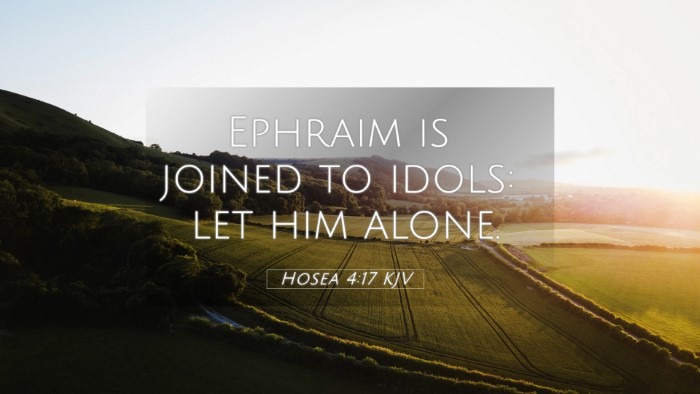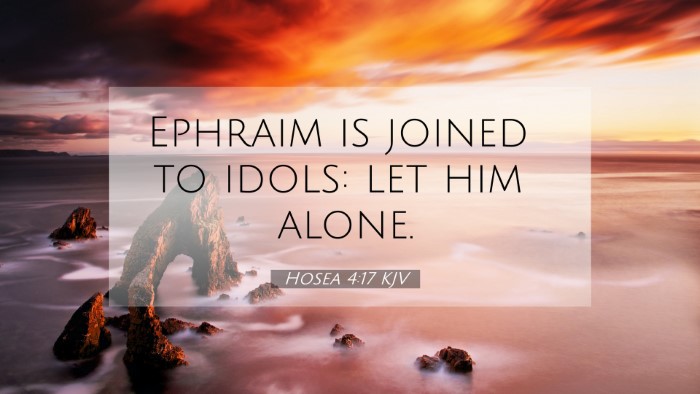Old Testament
Genesis Exodus Leviticus Numbers Deuteronomy Joshua Judges Ruth 1 Samuel 2 Samuel 1 Kings 2 Kings 1 Chronicles 2 Chronicles Ezra Nehemiah Esther Job Psalms Proverbs Ecclesiastes Song of Solomon Isaiah Jeremiah Lamentations Ezekiel Daniel Hosea Joel Amos Obadiah Jonah Micah Nahum Habakkuk Zephaniah Haggai Zechariah MalachiHosea 4:17 Similar Verses
Hosea 4:17 Cross References
Ephraim is joined to idols: let him alone.
Uncover the Rich Themes and Topics of This Bible Verse
Listed below are the Bible themes associated with Hosea 4:17. We invite you to explore each theme to gain deeper insights into the Scriptures.
Hosea 4:17 Cross Reference Verses
This section features a detailed cross-reference designed to enrich your understanding of the Scriptures. Below, you will find carefully selected verses that echo the themes and teachings related to Hosea 4:17 KJV. Click on any image to explore detailed analyses of related Bible verses and uncover deeper theological insights.

Psalms 81:12 (KJV) »
So I gave them up unto their own hearts' lust: and they walked in their own counsels.
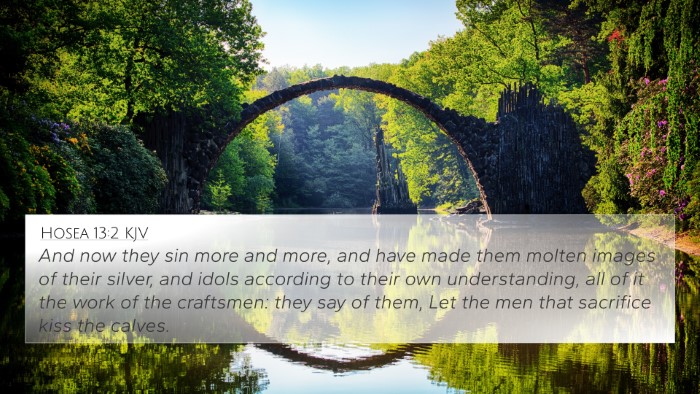
Hosea 13:2 (KJV) »
And now they sin more and more, and have made them molten images of their silver, and idols according to their own understanding, all of it the work of the craftsmen: they say of them, Let the men that sacrifice kiss the calves.
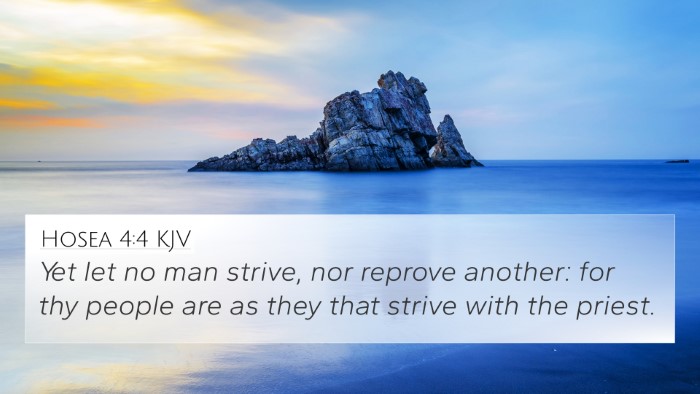
Hosea 4:4 (KJV) »
Yet let no man strive, nor reprove another: for thy people are as they that strive with the priest.

Matthew 15:14 (KJV) »
Let them alone: they be blind leaders of the blind. And if the blind lead the blind, both shall fall into the ditch.

Hosea 12:1 (KJV) »
Ephraim feedeth on wind, and followeth after the east wind: he daily increaseth lies and desolation; and they do make a covenant with the Assyrians, and oil is carried into Egypt.
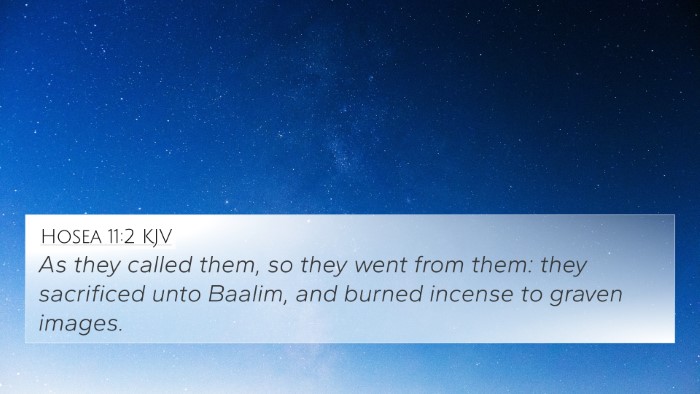
Hosea 11:2 (KJV) »
As they called them, so they went from them: they sacrificed unto Baalim, and burned incense to graven images.
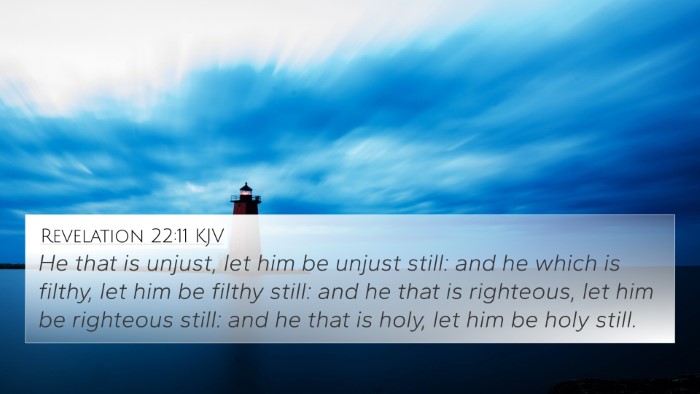
Revelation 22:11 (KJV) »
He that is unjust, let him be unjust still: and he which is filthy, let him be filthy still: and he that is righteous, let him be righteous still: and he that is holy, let him be holy still.
Hosea 4:17 Verse Analysis and Similar Verses
Bible Verse Meaning of Hosea 4:17
Verse Reference: Hosea 4:17
Verse: "Ephraim is joined to idols: let him alone."
Summary Interpretation: This verse addresses the spiritual state of the Israelites, particularly focusing on Ephraim, a significant tribe in Israel. The mention of idols underscores the people's unfaithfulness and idol worship, which is a recurring theme throughout the Book of Hosea. The directive to "let him alone" implies a divine abandonment or a recognition that Ephraim has chosen its path.
Insights from Classic Commentators
Matthew Henry's Commentary
Matthew Henry elucidates that Ephraim's attachment to idols indicates a deep-rooted spiritual decline. He notes that God's patience has limits, and when the people persist in idolatry, there comes a time when divine intervention is withdrawn. Henry emphasizes the warning against complacency in sin.
Albert Barnes' Notes
Albert Barnes expresses the notion that God, in this verse, is highlighting Ephraim's decision to pursue idolatry. He mentions that God strongly desires His people to turn from false gods. By saying "let him alone," Barnes interprets it as God allowing Ephraim to face the consequences of their choices—suggesting a period of judgment may follow their refusal to repent.
Adam Clarke's Commentary
Adam Clarke discusses the phrase "joined to idols," portraying it as an intimate and binding relationship with idol worship. He elaborates that Ephraim's determination to follow idols reflects a broader trend of rebellion against God. Clarke warns that turning from God leads to spiritual emptiness and societal consequences.
Cross References
This verse can be linked with the following scripture passages:
- Exodus 20:3-5: Emphasis on exclusive worship of God
- Isaiah 44:9-20: A critique of idol creation and worship
- Hosea 10:1: The fruitfulness of Israel turning into vanity
- Jeremiah 2:13: God's lamentation over forsaking Him for broken cisterns
- Psalms 115:4-8: The futility of idols
- 1 Corinthians 10:20: The nature of sacrifices made to idols
- Revelation 18:2: The fall of Babylon identified with idol worship
Thematic Connections
The themes of idolatry, abandonment, and divine judgment woven through Hosea resonate with broader biblical narratives. Through comparative Bible verse analysis, we observe:
- Idolatry and Spiritual Adultery: See Jeremiah 3:6-10 for parallels on spiritual infidelity.
- Consequences of Rebellion: Compare with Deuteronomy 28:15-68, which outlines blessings and curses based on obedience.
- The Patience of God: Reference 2 Peter 3:9, where God’s longsuffering is emphasized.
- Divine Call to Repentance: Link with Amos 5:14-15, urging a return to justice and righteousness.
- Spiritual Barrenness of Idol Worship: See Galatians 4:8-9, a reflection on turning from idols to God.
Understanding Scriptural Cross-Referencing
In examining Hosea 4:17, we can effectively utilize tools for Bible cross-referencing as follows:
- The Bible Concordance: Aids in locating verses related to themes of idolatry.
- Bible Cross-Reference Guide: Helps navigate similar sentiments across both Testaments.
- Bible Chain References: Enables tracking of concepts from one verse to another.
- Cross-Referencing Bible Study Methods: Offers organized techniques to analyze and correlate Scriptures effectively.
Finding Bible Verse Connections
For those exploring how to find cross-references in the Bible, utilizing a systematic approach is essential. Consider the following strategies:
- Examine the context and themes presented in the verse.
- Look for familiar phrases or terminologies that may link to other Scriptures.
- Utilize digital as well as print resources to explore concordances and reference tools.
Conclusion
Hosea 4:17 serves as a profound reminder of the consequences of spiritual unfaithfulness and idolatry. Through scriptural cross-referencing, we can uncover a wealth of thematic connections that enhance our understanding of God’s expectations and the pervasive nature of idolatry within His people. Engaging in such comparative Bible verse analysis enriches one’s spiritual study and fosters a deeper connection to God’s Word.

